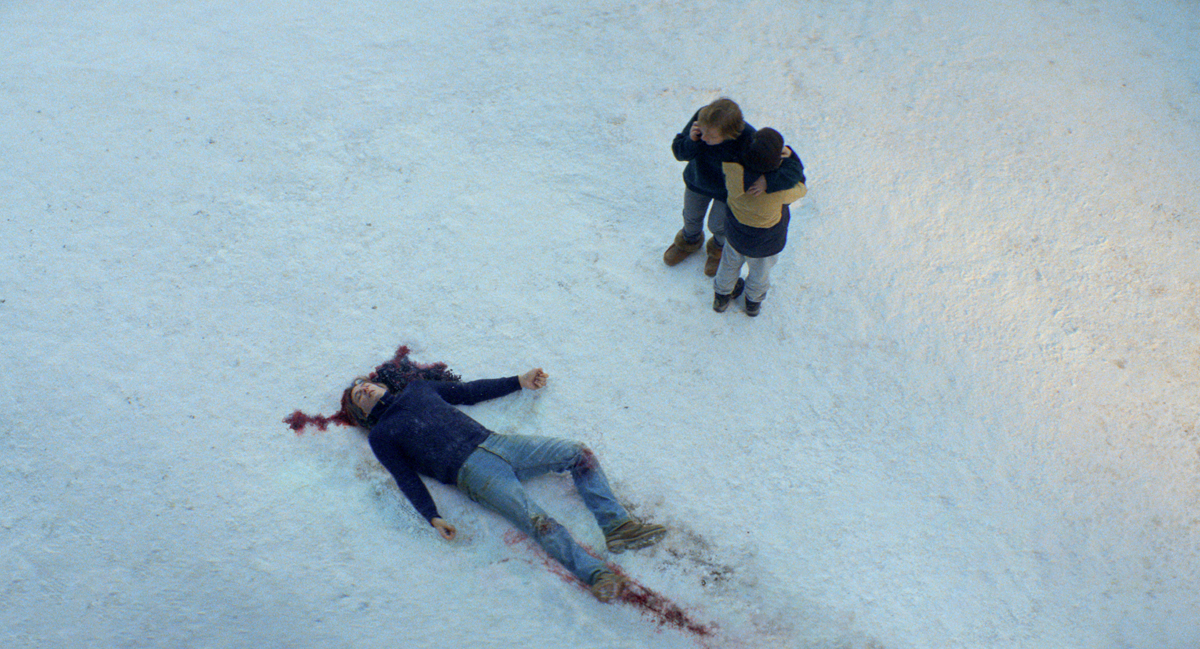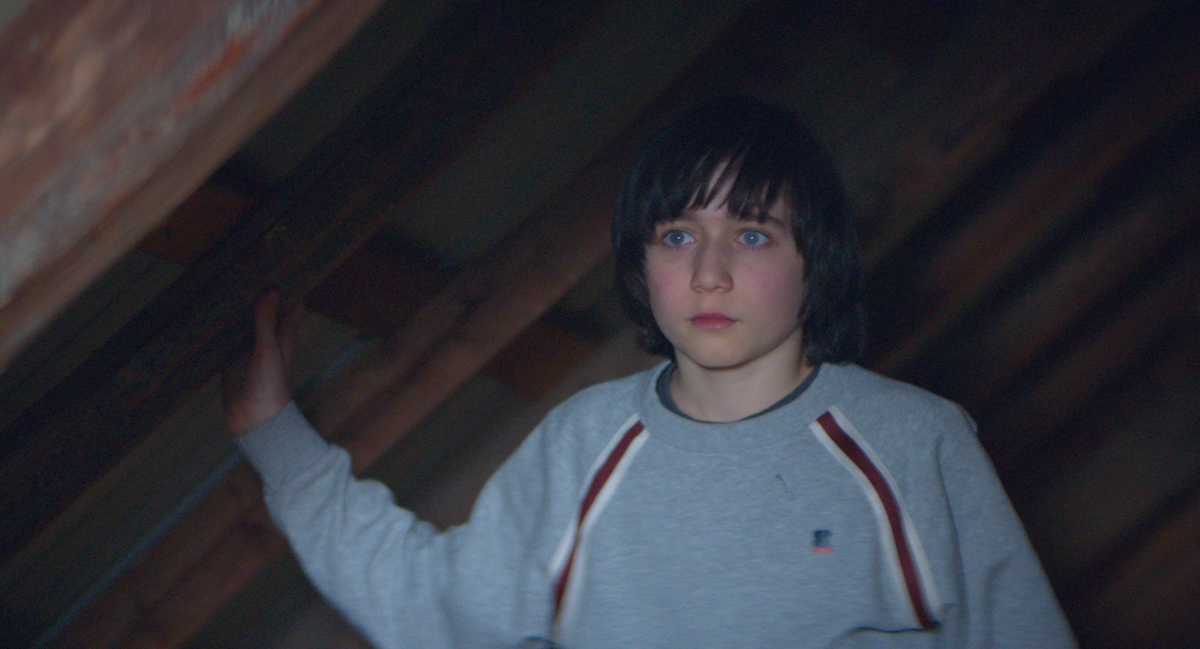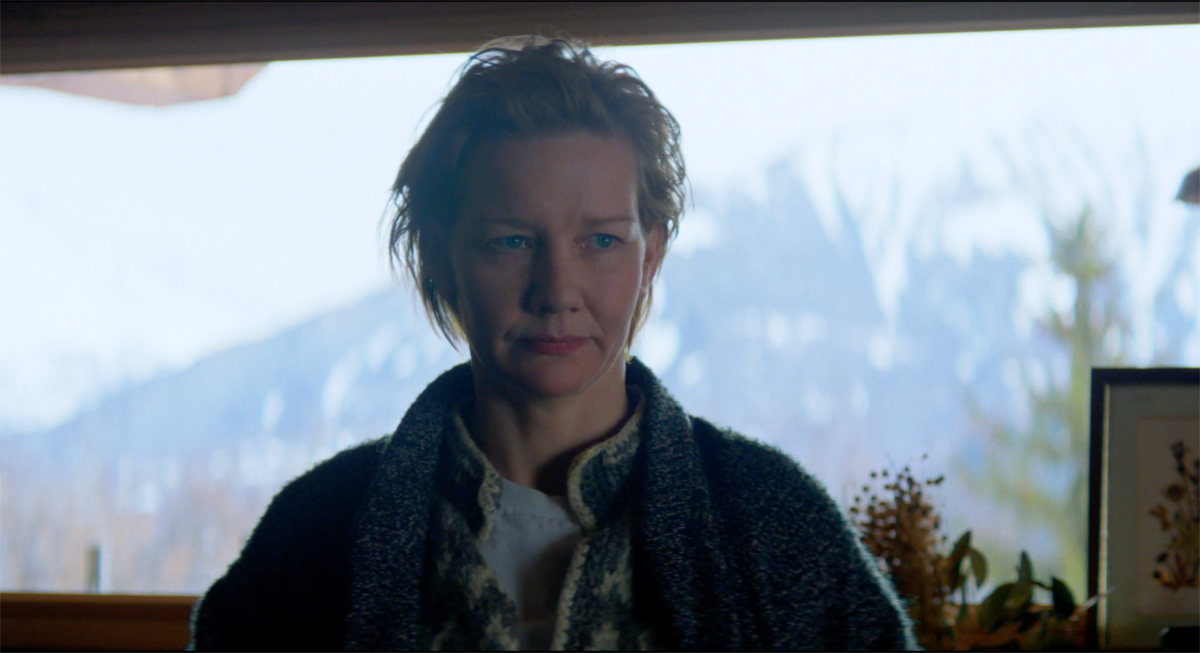 Melissa Anderson
Melissa Anderson
To know or not to know: in French director Justine Triet’s new film, there may be no solutions to the mysteries of marriage and death.

Samuel Theis as Samuel Maleski, Sandra Hüller as Sandra Voyter, and Milo Machado Graner as Daniel in Anatomy of a Fall. Courtesy Neon.
Anatomy of a Fall, directed by Justine Triet, now playing in theaters
• • •
An agile film propelled by epistemological quandaries, Justine Triet’s Anatomy of a Fall aptly begins with this question: “What do you want to know?” It is asked by Sandra (Sandra Hüller), a German writer who is being interviewed at her home in a remote hamlet in the French Alps by Zoé (Camille Rutherford), a younger woman and a graduate student in Grenoble. The query is both straightforward and somewhat flirtatious; moments later, Sandra says to her interlocutor, “What I do know is my interest in you.” More violent types of verbal jousting—interrogation in a courtroom, a couple’s heated argument—dominate the movie. Anatomy of a Fall, which Triet cowrote with Arthur Harari (who is also her romantic partner), keenly builds suspense from this volubility: torrents of words incapable of unequivocally establishing what is true and what is false, what is known and what will forever be unknowable.
During that Q&A in Sandra’s living room, a steel drum–heavy instrumental cover of 50 Cent’s “P.I.M.P.” plays, at deafening volume, from a higher floor of the chalet. The music has been cued up by Sandra’s unseen husband, Samuel (Samuel Theis), while he works on renovations to the attic, as she explains to her guest, her resignation suggesting that she’s grown used to such extreme passive-aggressive behavior. Since the din makes it impossible to continue the interview, Zoé leaves. Exiting shortly after her is Daniel (Milo Machado Graner), the couple’s visually impaired eleven-year-old son, who goes for a walk with the dog. When the boy returns, those steel drums are still blaring—and his father’s bloodied corpse is lying face-up in the snow. Indicted for her spouse’s murder, Sandra insists she’s innocent. Maybe Samuel fell or suicided, she avers to Vincent (Swann Arlaud), an old lawyer friend she has summoned to defend her.

Milo Machado Graner as Daniel in Anatomy of a Fall. Courtesy Neon.
The title of Triet’s latest is a nod to Otto Preminger’s 1959 Anatomy of a Murder. That courtroom classic is based on an actual case—as was last year’s Saint Omer, from Alice Diop, another excellent French film that, similar to Triet’s, investigates the brutality of legal discourse. Although Anatomy of a Fall has no real-world analogue, it proceeds with painstaking precision, sifting through and analyzing not only the forensics of a possible crime but also the curdling of a marriage.
One of the most contentious sessions of the lengthy trial involves playing an audio recording of a fight between the spouses that Samuel surreptitiously made the day before his death. At first we experience this argument as those in the courtroom do: as a volley of agitated, disembodied voices. But soon this altercation is dramatized onscreen, providing a rare instance of flashback and our longest look at Samuel, who has been a phantom up to this point. In this barrage of recriminations, Samuel—miserable because he has not been able to finish a novel (unlike his prolific wife) and still racked with guilt about the accident that, seven years ago, caused their son’s damaged eyesight—lashes out that he must always follow Sandra’s schedule; that she imposes English, her language of choice, on the family; that she cheats on him. She swiftly rebuts these charges: that it is his, not her, horrible time-management that is the problem; that he insisted they leave London, where she had been living happily, to return to his isolated French hometown; that she uses English as “a middle ground” between their respective native tongues; that, frustrated with their sexless marriage, she refuses “to rot inside” and finds carnal pleasure elsewhere.
It’s a dynamite scene, the emotional litigation between the spouses akin to the arguments and counterarguments launched during the trial. Triet cuts back to the courtroom for the conjugal fight’s conclusion: the sounds of violent struggle and objects being thrown, which Vincent asks his client to describe. The ensuing cross-examination is ferocious, the lead prosecutor (Antoine Reinartz, as electrifying here as he was in 2017’s BPM, an ensemble drama about ACT-UP Paris in the ’90s) relentlessly questioning Sandra about her putative infidelities, among many other accusations leveled at her by her husband on that tape.

Sandra Hüller as Sandra Voyter in Anatomy of a Fall. Courtesy Neon.
Given her métier, Sandra, of course, knows how to do things with words. Yet for every astute rejoinder to the prosecutor—declaring, for instance, that in the volatile exchange just played, there are bound to be exaggerations—she makes dubious decisions, including a pedantic parsing of “cheating” and an admission that she had lied earlier. Her assertion that her French is poor also seems suspect; sometimes she responds quite fluently en français in the courtroom, while at others she insists on answering in English. But one of the proclamations she issues while on the stand, however subjective, also seems unimpeachable: “Sometimes a couple is a chaos.”
That observation has been one of the animating principles in all four of Triet’s narrative features. Sibyl (2019), her previous film, derived most of its fizzy screwball energy from the marital mayhem that follows when an actor begins an affair with his costar during the production of a movie directed by his wife, played by Hüller, in her first collaboration with Triet (the German actress is probably best known in the US for her role as the careerist corporate strategist aggrieved by her practical-joker father in Maren Ade’s comedy of manners Toni Erdmann, from 2016). Yet Anatomy of a Fall is the soberest of Triet’s projects to date: not played for laughs, that chaos is instead explored for the ways that it makes each member of a dyad a continuously unreliable narrator, so practiced at dissimulation (another of Triet’s abiding themes) that honestly articulating feelings, wishes, needs may become impossible.
Rousing Daniel from sleep one night, Sandra tells her son—an exceptionally sensitive child and a key witness—that his father was her “soulmate,” an avowal that he, and we in the audience, has to take on faith (a montage of photos, flashing during the opening credits, of the couple in much happier times helps bolster her claim). It cannot be proved, particularly when pulled apart and dissected in a court of law. Asked to comment after the verdict has been handed down, Sandra responds, “There were too many words in this trial. I have nothing to say.” Those words have disclosed, concealed, repudiated, and persuaded. Yet what have they confirmed? Veracity remains elusive; we are no closer to understanding Sandra and her marriage by the film’s conclusion. The case may be closed, but those mysteries are open-ended.
Melissa Anderson is the film editor of 4Columns and the author of a monograph on David Lynch’s Inland Empire from Fireflies Press.